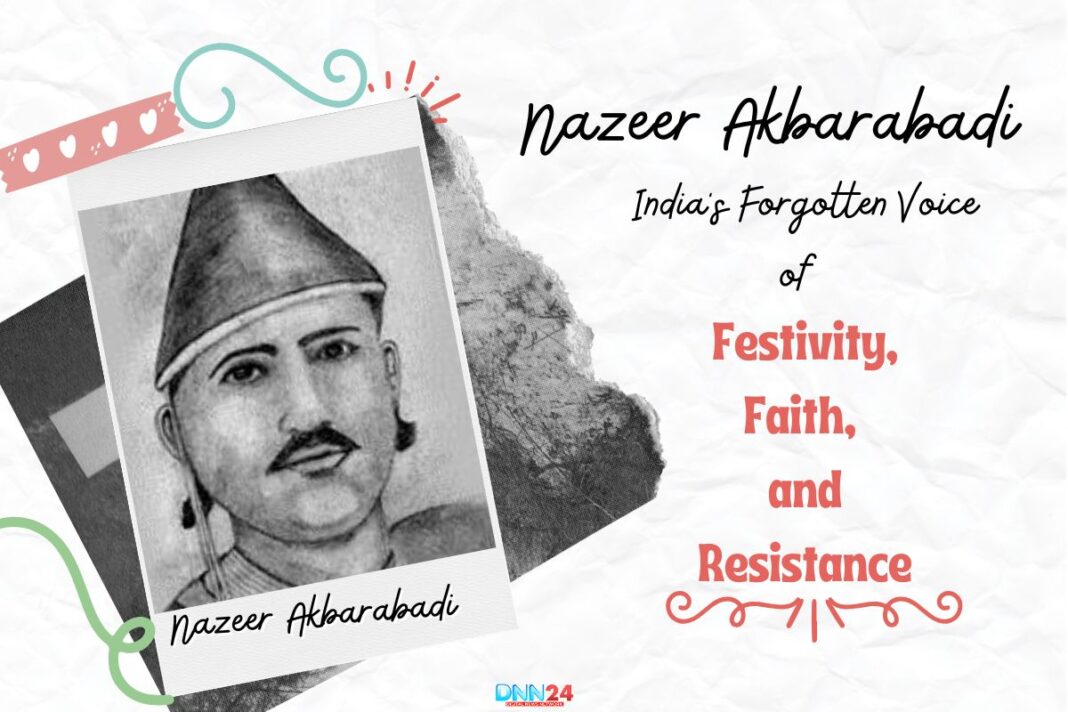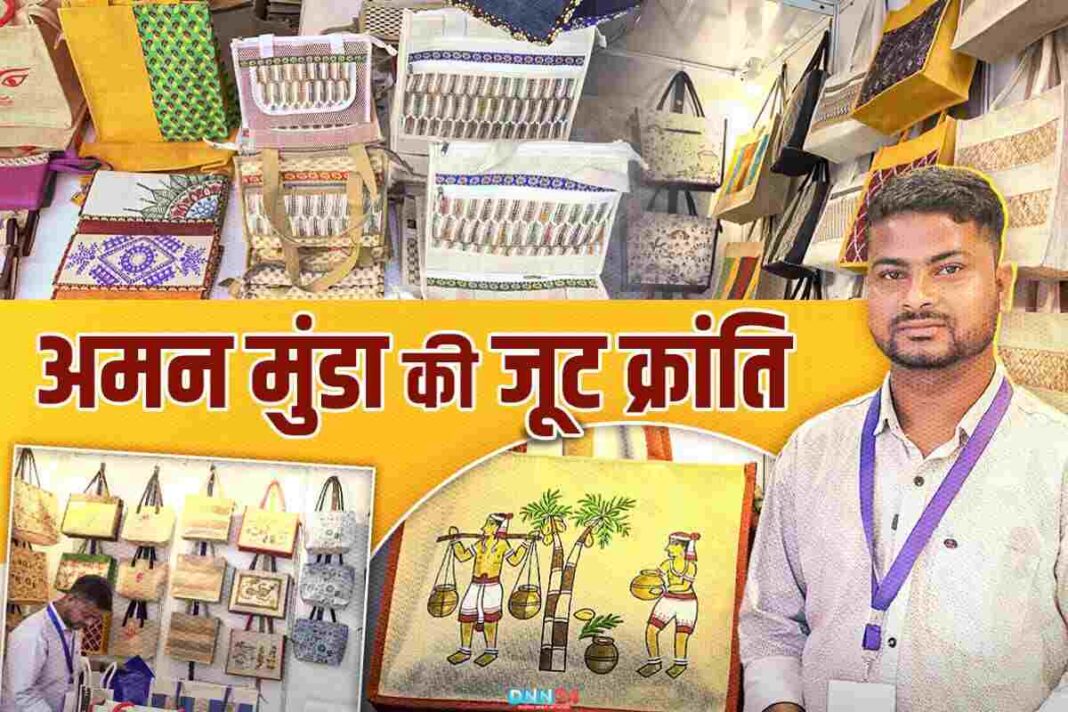Nazeer Akbarabadi, born Wali Muhammad in 1735 in Delhi, entered a world swirling with chaos and change. Nadir Shah’s bloody attack on Delhi in 1739 and later Ahmad Shah Abdali’s raid in 1757 are the main events that marked his childhood. These horrors forced young Nazeer, his mother, and his grandmother to flee their beloved city for Akbarabad (now Agra), a journey that would shape his soul and poetry.
Tha iraada teri fariyaad karein haakim se,
Nazeer Akbarabadi
Woh bhi ae shokh tera chaahne waala nikla
There was a weakened Mughal Empire, ambitious new powers were coming to power, and regular people faced mistreatment. Despite the gloom, Nazeer’s heart felt the happiness and pain of things that happen in everyday situations. Like many others, he began in the dust and bazaars of his hometown, sharing laughter and frustration with the regular people. His poems express their feelings, mirror their experiences, and sing in their place.
Dur se aae the saqi sun ke mai-KHane ko hum
Nazeer Akbarabadi
bas taraste hi chale afsos paimane ko hum
mai bhi hai mina bhi hai saghar bhi hai saqi nahin
dil mein aata hai laga den aag mai-KHane ko hum
kyun nahin leta hamari tu KHabar ai be-KHabar
kya tere aashiq hue the dard-o-gham khane ko hum
The Poet Appreciated Everyday Life
He wrote his poetry for people other than monarchs or elite members of society. He wrote stories about people facing difficulties, such as the fruit seller, the beggar, the washerman and the child playing with a kite. The street, the marketplace and the music of Diwali, Holi and Eid all appeared in his verses. He focused his writing on melons, cucumbers, coins, rotis, poverty, laughter, hunger, and the happiness of being together.
Juda kisi se kisi ka gharaz habib na ho,
Nazeer Akbarabadi
Ye daagh woh hai ke dushman ko bhi naseeb na ho
Instead of admiring the great and the famous, Nazeer discovered poetry in everyday events and simple things. In Lala’s opinion, the real history of India could not be read in court but in the memories of those who lived through it. Ghalib’s nazms were eternal since everyone shared them. Schoolchildren still recite his “Banjaranama” (Chronicle of the Nomad) and “Aadmi Naama” (Chronicle of Man), poems that capture the spirit of India’s streets and souls.
kaha jo hum ne hamen dar se kyun uThate ho
Nazeer Akbarabadi
kaha ki is liye tum yan jo ghul machate ho
kaha laDate ho kyun hum se ghair ko hamdam
kaha ki tum bhi to hum se nigah laDate ho
kaha jo haal-e-dil apna to us ne hans hans kar
kaha ghalat hai ye baaten jo tum banate ho
The Nawab gave the Fakir a gift, and the poet faced a choice
There is a tale that the locals pass on about Nazeer’s good nature. Once, Saadat Ali Khan, the Nawab of Lucknow, gave Nazeer gifts and asked him to perform in his court. He got the gifts from the strangers but did not sleep all night. He went home in the morning, saying, “Now Nazeer is happy with his belongings in the hut.” The path he is meant to follow is not to lead him to the royal palace. Again, the Nawab’s men attempted to win her heart with kind words and affection.
The hum to khud-pasand bahut lekin ishq mein
Nazeer Akbarabadi
Ab hai wahi pasand jo ho yaar ko pasand
He finally agreed to leave Agra this time, but he couldn’t stop watching the Taj Mahal in the distance. Nazeer noticed that his horse had gone back, and he understood that his true love was for the people in Agra, not for royalty. He pointed out that you could refer to him as a pauper, a fakir or a poet, but Nazeer was always from Agra. What makes this story unique is the poet’s decision to stay true to the simple folk rather than follow the wishes of the rich and famous.
Hum ashk-e-gham hain agar tham rahe rahe na rahe
Nazeer Akbarabadi
mizha pe aan ke Tuk jam rahe rahe na rahe
rahen wo shaKHs jo bazm-e-jahan ki raunaq hain
hamari kya hai agar hum rahe rahe na rahe
mujhe hai naza wo aata hai dekhne ab aah
ki us ke aane talak dam rahe rahe na rahe
The Father of Nazm: A New Voice for a New Age
Nazeer Akbarabadi is called the “Father of Nazm” in Urdu poetry. Earlier, poetry was mainly focused on love, ruling monarchs or distant dreams, using elaborate words. Nazeer managed to push through these boundaries. Because he wrote in Urdu, everyone recognised and understood, and people without books could also appreciate and enjoy his works. His poems reflected all the sounds in Agra, including the voices of kids, those selling fruits and even the bustling noises of the city. He described everything: different weather, essential celebrations, savouring sweet melon in the summer, poverty and the harmony between Hindus and Muslims.
Dil ki betaabi nahin thaharne deti hai mujhe
Nazeer Akbarabadi
Din kahin, raat kahin, subah kahin, shaam kahin
When British officials tried to separate India by faith, Nazeer urged unity through his poetry. He described Rakhi, Diwali, and Eid, proving that India’s true strength was in the way different religions united. His writings protested those in power and foreigners and reflected authentic Indian culture.
LipaT lipaT ke main us gul ke sath sota tha
Nazeer Akbarabadi
raqib subh ko munh aansuon se dhota tha
tamam raat thi aur kuhniyan o laten thin
na sone deta tha mujh ko na aap sota tha
jo baat hijr ki aati to apne daman se
wo aansu ponchhta jata tha aur main rota tha
Hidden sorrows and a smile that keeps coming back.
Nazeer went through many hardships during his life. Although life was often tough for him, full of poverty, he continued to smile and believe in others. Even though he wrote more than 200,000 verses, only about 6,000 exist in our collections, as a lot was forgotten. It took time for others to realise his genius since he targeted his writing at people without power, not those in charge. His poems have survived even after many kings and courtiers have passed away.
Mai pee ke jo girta hai to lete hain use thaam
Nazeer Akbarabadi
Nazron se gira jo use phir kis ne sambhaala
Students learn them in schools, shopkeepers recite them in bazaars, and visitors remember them wherever people in India have fun, face difficulties, and dream their dreams. Nazeer passed away in 1830, having lived for 95 years. What he left behind continues to shine with life. He could see greatness in everyday things such as food, festive events or children’s activities.
Juda kisi se kisi ka gharaz habib na ho
Nazeer Akbarabadi
ye dagh wo hai ki dushman ko bhi nasib na ho
juda jo hum ko kare us sanam ke kuche se
ilahi rah mein aisa koi raqib na ho
ilaj kya karen hukama tap-e-judai ka
siwae wasl ke is ka koi tabib na ho
‘nazir’ apna to mashuq KHubsurat hai
jo husn us mein hai aisa koi ajib na ho
The Influence Continuing Today
Today, Nazeer Akbarabadi is remembered as the poet of the people, the voice of India’s soul. Through his poems, readers discover how to see joy in life, unite with others, smile at hard times and be generous. He proved that poetry is meant for every person who has feelings, dreams and hopes, not only for those who are wealthy or educated. In his verses, people see an energetic Agra, bright Indian festivals and the unending joy of those with little. Nazeer’s poetry works are like the country’s life and soul.
Kyun nahin leta hamari tu khabar ai be-khabar
Nazeer Akbarabadi
Kya tere aashiq hue the dard-o-gham khane ko ham?
Also Read: Meer Hasan: The Poet of Silent Sorrows and Enduring Song
You can connect with DNN24 on Facebook, Twitter, and Instagram and subscribe to our YouTube channel.



